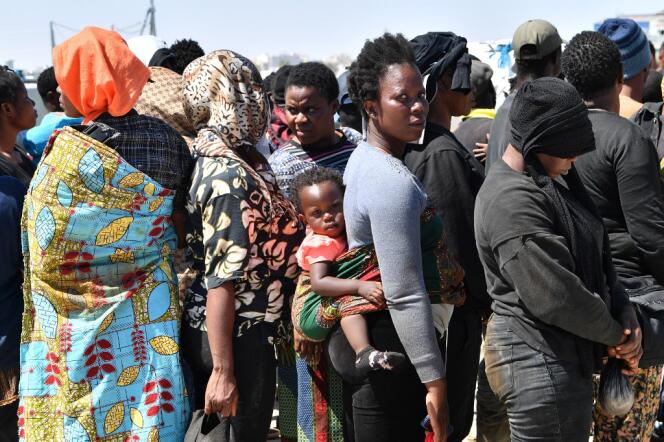
At a time when migrant boat arrivals from Tunisia on the island of Lampedusa are increasing, Tunis is stepping up its operations against sub-Saharan nationals still present in Sfax, the country's second-largest city. Supported by photos, the Ministry of the Interior announced on Sunday, September 17, that it had evacuated the city's historic center, where hundreds of migrants had taken refuge after being evicted from their homes in early July. With the support of the police, they had been the object of a manhunt. "This security campaign has been well received by local residents, particularly following the restoration of public order and the evacuation of public squares," the Interior Ministry said in a statement issued at the end of the day.
Earlier in the week, the ministry had already warned the organizations helping the migrants and, according to a volunteer present on site who requested anonymity, prevented the volunteers from assisting them. Transported on Saturday and Sunday in buses belonging to the Sfax regional transport company, hundreds of people were moved to rural areas a few dozen kilometers away, particularly in the localities of Jebiniana and El Amra.
'A purely security response'
"There was no resistance because they were led to believe that they would be taken care of in camps, whereas in fact they were dumped in the middle of olive groves," explained Romdhane Ben Amor, spokesperson for the Forum Tunisien des Droits Economiques et Sociaux (FTDES), a local NGO. Videos shared on social media show local residents protesting the arrival of buses, escorted by National Guard vehicles, transporting migrants dislodged from the center of Sfax and dropping them in the road in the middle of the countryside. "The Tunisian authorities' response is purely security-oriented and similar to European policy. We're repeating the same mistakes," said Ben Amor.
After days of high tension following the death of a Tunisian man on July 3, killed in a brawl with sub-Saharan migrants, according to the official version, hundreds of sub-Saharan Africans were expelled from Sfax and driven into the desert on the Algerian and Libyan border. Abandoned without food or water in the scorching heat, at least 25 of them perished, according to humanitarian sources, while hundreds of others walked dozens of kilometers before being rescued, placed in more or less official reception centers or released.
This time, the migrants have been moved to coastal areas north of Sfax, known to be preferred departure points for the Italian coast, particularly the island of Lampedusa, less than 150 km away. "There are hundreds of migrants who were already here in El Amra since what happened in July. They stay here for days, even weeks, before embarking. It's one of the main departure areas in the region," said Wahid Dahesh, an activist present on the ground. Ben Amor added, "It's as if they're pushing them to leave, when they don't even have the means to pay for their crossing. We're leading them to their deaths."
'Propaganda'
Since September 11, the small island of Lampedusa, with its 7,000 inhabitants, has seen a record number of arrivals of makeshift boats from Tunisia. In less than 72 hours, up to 6,800 people, mainly from sub-Saharan Africa, arrived on the island. Two months after the signing of a memorandum of understanding between Tunisia and the European Union (EU) aimed at increasing border controls south of the Mediterranean, the Tunisian authorities seem overwhelmed by the growing number of people leaving for Europe.
In July, the spokesperson for the Tunisian National Guard told Le Monde that over 30,000 migrants had been intercepted in the first six months of 2023, a number that has increased more than tenfold since 2019. "The security apparatus is exhausted, lacks resources and has been working continuously for several months," said Ben Amor. The EU had pledged, in vague terms, to "provide sufficient additional financial support, in particular for the provision of equipment, training and technical support necessary to further improve the management of Tunisia's borders," as stated in the agreement between the two parties, which has been slow to be implemented.
According to a number of NGOs in Tunisia, these mass departures have been helped by mild weather and a fall in the cost of the crossing, at an average offer price of 1,500 dinars per person (less than €500), compared with an average of almost €2,000 in 2022. This drop is due to the use of metal boats, which are cheaper to produce but also more fragile. These departures can also be explained by the living conditions of sub-Saharan migrants, "which have deteriorated considerably since they can no longer find housing or work. Some of them thought they were planning their migration over a long period of time, but had to rush their departure," explained Ben Amor. For him, the official discussion on the fight against smuggling networks, by both Tunisia and the EU, is "propaganda."